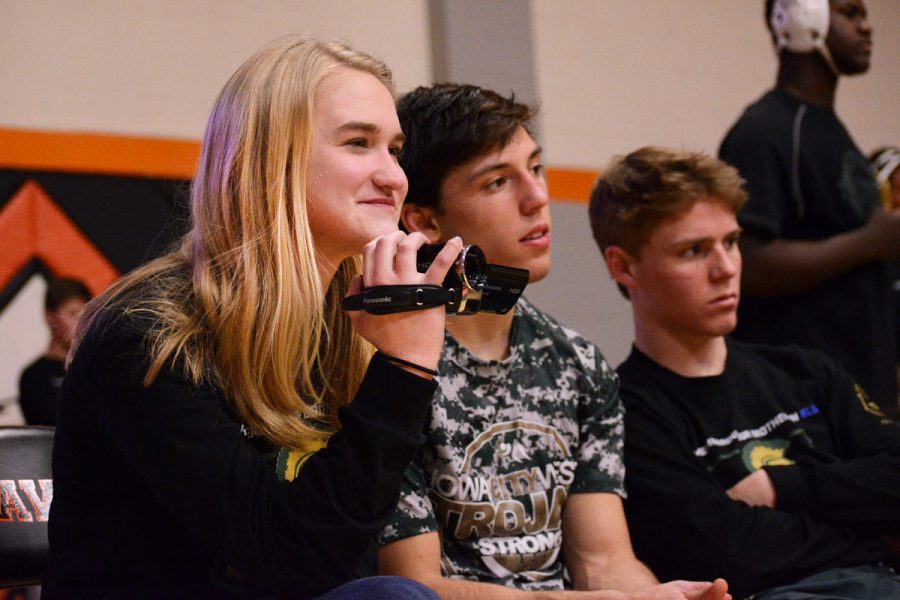Managing the transition
Laurel Haverkamp ‘20 was considering wrestling in high school, but ultimately became a sports manager instead.
As part of her duties as a manager for the West Wrestling team, Laurel Haverkamp ’20 records a match during the West vs. Cedar Rapids Prairie meet on Feb. 2, 2017.
All athletes reach a point in their career when they are no longer able to compete at a high level. Some athletes suffer career-ending injuries while others simply lose interest in the sport they once loved. But as the saying goes, when one door closes another one opens.
Laurel Haverkamp ‘20 has managed for the wrestling team since her freshman year and has become an integral part of the team’s success over the past three seasons.
Haverkamp wrestled in junior high for two years before arriving at West. She was initially hesitant to join because of the stigma that came with being the only female athlete on the team.
“It’s super intimidating as a sport in general,” Haverkamp said, “it’s also intimidating being the only girl in the wrestling room.”
Haverkamp contemplated the idea of wrestling at the high school level, but joining the prestigious West High wrestling program proved to be an entirely different challenge. Junior high wrestlers aren’t forced to cut weight or go through rigorous training routines like the ones that West High wrestlers endure.
The intensity of high school wrestling ultimately deterred Haverkamp from competing, but she was determined to help the team nonetheless.
“She asked if she could be a manager and we said absolutely,” said assistant wrestling coach Kody Pudil, “she has a knowledge for the sport.”
As a wrestling manager, Haverkamp assumes a variety of responsibilities before, during and after the matches.
Having wrestled before, Haverkamp has a certain level of empathy for what the athletes go through.
“Physically, it’s a super hard sport but there’s so much mental stuff going on that I can’t even start to understand,” said Haverkamp. “I think having understood small bits of it, I have more respect for them.”
Having a sense of what the wrestlers are going through has helped Haverkamp deal with the issues she faces as a manager. Understanding the pressures of competing and the stress that comes along with it remind her to limit any distractions the wrestlers might face.
“I think of my job as like making it easier for them,” said Haverkamp.
Haverkamp’s main jobs are to keep score and take film during the meets, something wrestler Will Hoeft ‘20 has come to appreciate.
“They took lots of videos of us wrestling and just reviewing our performance really helped us to improve as a team,” said Hoeft.
There is a lot of behind the scenes work involved in order to help the wrestlers achieve their goals. Early morning weigh-ins and late night matches keep wrestling managers working from dawn to dusk during weekend tournaments.
Managing has given Haverkamp the opportunity to form lifelong friendships and stay close to the sport that she enjoyed so much in junior high.
Haverkamp still looks fondly on her memories as a competitor and takes pride in the courage it took to join the wrestling team as a female knowing that her decision would be scrutinized.
“Wrestling,” said Haverkamp, “is a chance for people, regardless of their gender, to step outside of their comfort zone and better themselves.”
Your donation will support the student journalists of West High School. Your contribution will allow us to purchase Scholarship Yearbooks, newsroom equipment and cover our annual website hosting costs.

Joe is in his second year working for the West Side Story publications as the sports editor. Joe plays golf, basketball and runs track at West High. He...

(she/her) Alyssa Skala is a senior at West. She is a third year photographer on staff and a second year editor for yearbook. When she doesn't have her...



